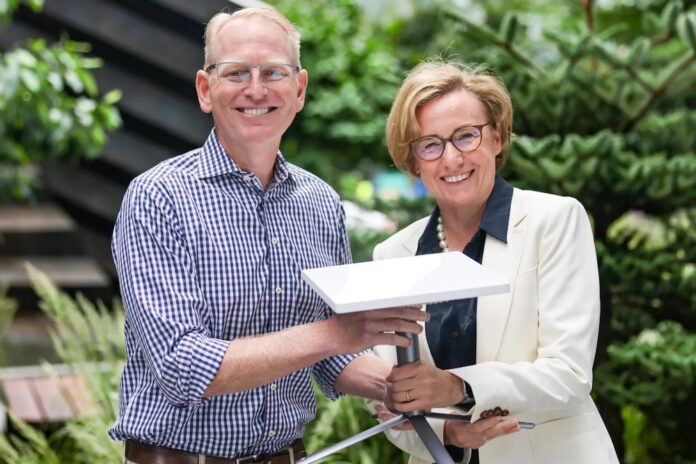Once launched, the telco will use the constellation to extend 4G and 5G services in Europe and Africa
Vodafone and Vodacom have announced they will use Project Kuiper’s low Earth orbit (LEO) satellite constellation to extend the reach of their 4G/5G networks in Europe and Africa. The telcos plan to participate in beta testing of Project Kuiper service by the end of 2024 with select customers.
After facing some delays, Amazon has confirmed its prototype satellites will launch on an upcoming United Launch Alliance Atlas 5 mission set for Autumn – ahead of deploying production satellites in 2024 that would be built in-house.
The two telcos want to trial the LEO services in areas where fibre and microwave may otherwise be uneconomic. This would include mobile backhaul.
Amazon knows it needs to get a wriggle on with its 3,200-satellite constellation given it needs to have half of the constellation launched by July 2026 to meet its Federal Communications Commission licence obligations. The other half will need to be launched before the end of 2029.
As a result, the company has signed massive launch contracts, opened new manufacturing facilities, and unveiled user terminal designs, according to Via Satellite. In July, Amazon announced a $120 million investment in a new satellite processing facility at Kennedy Space Center in Cape Canaveral, where satellites will be integrated ahead of launch.
Pick a partner
Vodafone’s move is a key win for Amazon as it gears up to enter the race which has already seen SpaceX’s Starlink take up pole position with its own constellation and subsequent deals with telcos, beginning with T-Mobile US. Last month, Telefónica, through its global business unit Telefonica Global Solutions (TGS), announced it had become an authorised worldwide Starlink partner.
Vodafone is Amazon’s second big telco partner after Verizon went early, signing a deal in 2021.
In addition to the mobile backhaul and internet connectivity possibilities, Vodafone said it would also explore additional enterprise-specific offerings to provide businesses with comprehensive global connectivity solutions, such as backup service for unexpected events and extending connectivity to remote infrastructure.
“Vodafone’s work with Project Kuiper will provide mobile connectivity to many of the estimated 40% of the global population without internet access, supporting remote communities, their schools and businesses, the emergency services, and disaster relief,” said Vodafone Group chief executive Margherita Della Valle (above right). “These connections will be complemented further through our own work on direct-to-smartphone satellite services.”
“At Vodacom, our purpose is to connect for a better future, and we work every day to bring more people in Africa online,” said Vodacom Group CEO Shameel Joosub. “Collaborating with Project Kuiper gives us an exciting new path to scale our efforts, using Amazon’s satellite constellation to quickly reach more customers across the African continent.”
“Teaming with a leading international service provider like Vodafone allows us to make a bigger impact faster in closing the digital divide in Europe and Africa. Together we’ll explore how we can help our customers get the most value from expanded connectivity, particularly in areas like residential broadband, agriculture, education, healthcare, transportation, and financial services,” said Amazon SVP for devices and services Dave Limp (above left).
Vodafone is an investor in AST SpaceMobile and participated in satellite-to-cell tests with the company earlier this year – tests that demonstrated two-way voice calls to unmodified smartphones via satellite. Vodafone Cook Islands and Ghana are also working with competing satellite-to-mobile company Lynk.



